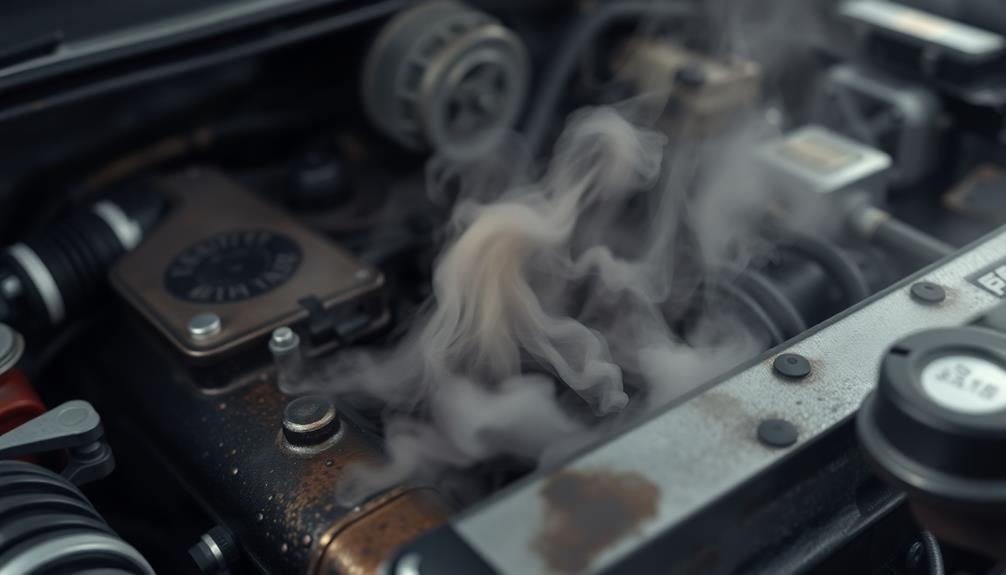When you catch a whiff of burnt transmission fluid, it's got a sharp, acrid smell that can remind you of burnt rubber or overheated oil. It's quite strong, and you might think of it like toasted bread left too long in the toaster! This scent usually means your vehicle could be experiencing some issues, like overheating or fluid breakdown, so it's a good idea to check things out right away. Make sure to peek at the transmission fluid color too. Bright red or pink is good, but dark brown or black signals trouble. Want to know how to solve these problems?
Key Takeaways
- Burnt transmission fluid has a sharp, acrid odor resembling burnt rubber or overheated oil.
- The smell can be overwhelming, similar to burnt toast.
- Dark brown or black fluid indicates overheating and breakdown of effectiveness.
- Contaminants like dirt can worsen the burnt smell and related issues.
- Immediate investigation is crucial upon detection to prevent further vehicle damage.
Introduction

Noticing a burnt transmission fluid smell can be alarming for any driver. It's like that unexpected surprise at a birthday party when you think everything's going smoothly! You might wonder, "What does this mean for my car?" Well, don't panic just yet. Understanding this smell is crucial because it often signals a problem that needs attention.
Transmission fluid is important because it helps your car shift gears smoothly, like a well-oiled machine. When it burns, it can create a nasty odor that you definitely don't want to ignore. You might smell it while driving or notice it when you park—either way, it's a sign that your vehicle needs a little TLC.
If you catch this smell, it's time to act! Check your transmission fluid levels and look for any leaks or damage. Sometimes, the issue can be as simple as overheating, but it could also mean more serious problems.
So, grab your toolbox or call a mechanic! Remember, staying informed about these smells keeps your car happy and healthy, letting you hit the road with confidence.
Now, let's dive into what that burnt smell actually is!
Description of the Smell

When you catch a whiff of burnt transmission fluid, it's often described as a sharp, acrid smell—similar to burnt rubber or overheated oil.
Imagine standing near a campfire, where the smoke tickles your nose, but this scent is more intense and biting. It's like the smell of something really hot that's gone wrong, and you can almost feel it in your throat!
If you've ever left a piece of toast in the toaster for too long, you might remember that burnt smell that fills the air. That's pretty close!
This odor can sneak up on you, especially when you're working on your car or if you've been driving for a while. You might even wrinkle your nose, thinking, "What's that awful smell?"
It's essential to pay attention because this odor might signal that something's amiss with your vehicle.
Source and Composition

Burnt transmission fluid typically originates from overheating or contamination within the transmission system. When your car's transmission gets too hot, it can cause the fluid to break down, losing its effectiveness.
Imagine trying to make a yummy soup, but you leave it on the stove for too long! Just like that soup, the fluid can start to smell and change its color.
Transmission fluid is usually a bright red or pink color and has a special mix of oils and additives, which help it work well. But when it overheats, it can turn dark brown or even black, and that's when it starts to smell burnt.
Contaminants, like dirt or metal shavings, can sneak into the fluid and create even more problems! This can make the transmission work harder, leading to more heat and, you guessed it, more burnt fluid.
Keeping an eye on the color and smell of your transmission fluid can help you catch issues early. If you notice a weird scent, it's time to check things out.
After all, you want your car to run smoothly and avoid any stinky situations!
Typical Scenarios or Environments

Experiencing burnt transmission fluid smell often occurs in specific scenarios, particularly during heavy driving conditions.
Imagine this: you're on a long road trip, cruising on the highway, and suddenly, you notice a strange smell wafting through the air. That could be burnt transmission fluid! This often happens when you're towing something heavy, like a trailer, or if you're driving up steep hills. In these situations, your vehicle's transmission works extra hard, which can cause the fluid to overheat and burn.
Another common scenario is during stop-and-go traffic.
When you're stuck in a jam, your transmission might struggle to keep up, leading to that unpleasant smell. Even if your car is in good shape, long periods of idling can create heat, which isn't great for your transmission fluid either!
Emotional or Cultural Associations

The smell of burnt transmission fluid can evoke a mix of anxiety and frustration for drivers. When you catch a whiff, it's like a warning bell ringing in your mind, alerting you that something's not right with your vehicle. You might feel your heart race, thinking about the potential cost of repairs or the hassle of finding a mechanic.
Isn't it funny how a single smell can bring on so many feelings?
In some cultures, certain car smells might remind folks of family road trips or fun adventures, but burnt transmission fluid isn't one of those pleasant memories. Instead, it's more likely tied to stressful moments, like getting stuck on the side of the road or dealing with unexpected car troubles.
You may even associate that burnt smell with the end of a joyful journey, turning into a hunt for solutions and repairs.
In a way, this smell connects us all through shared experiences, reminding us that cars can be both a source of joy and a cause for concern.
Health or Safety Considerations

Noticing a burnt transmission fluid smell can raise immediate health and safety concerns. When you catch a whiff of that strong odor, it's important to pay attention! Burnt transmission fluid may indicate overheating, which can lead to serious car troubles. If your vehicle starts acting funny, like slipping gears or unusual noises, it's a good idea to stop and investigate.
Now, let's talk about safety. Breathing in the fumes from burnt transmission fluid isn't great for you. If you're in a closed space, like a garage, and smell that burnt odor, it's best to step outside for some fresh air. You don't want to feel lightheaded or dizzy, right?
Also, be careful around a hot engine, as the burnt smell can mean parts are overheating. Touching anything that's too hot can lead to burns, and nobody wants that!
Final Thoughts

Checking your transmission fluid regularly can save you from costly repairs later on.
If the fluid looks dark and smells burnt, it's time to take action. Change the fluid or get a mechanic to take a closer look.
It's like giving your car a little spa day!
Frequently Asked Questions
Can Burnt Transmission Fluid Affect My Vehicle's Performance?
Yes, burnt transmission fluid can seriously affect your vehicle's performance. It reduces lubrication, increases friction, and can lead to overheating, causing potential damage to your transmission. Regular checks can help prevent these issues and maintain efficiency.
How Do I Know if My Transmission Fluid Is Burnt?
You can tell if your transmission fluid is burnt by checking its color and consistency. If it's dark brown or black and has a burnt smell, it's time to change it for optimal performance.
What Should I Do if I Smell Burnt Transmission Fluid?
If you smell burnt transmission fluid, you should stop driving immediately. Check the fluid level, inspect for leaks, and consider having a professional mechanic examine your vehicle to prevent further damage and costly repairs.
Is Burnt Transmission Fluid Harmful to Breathe In?
Breathing in burnt transmission fluid fumes isn't safe. You might experience irritation in your lungs or throat. If you notice a strong odor, it's best to ventilate the area and avoid prolonged exposure.
How Often Should I Check My Transmission Fluid?
You should check your transmission fluid every 30,000 to 60,000 miles, or at least once a year. Regular checks help ensure your vehicle runs smoothly and can prevent costly repairs down the road.










